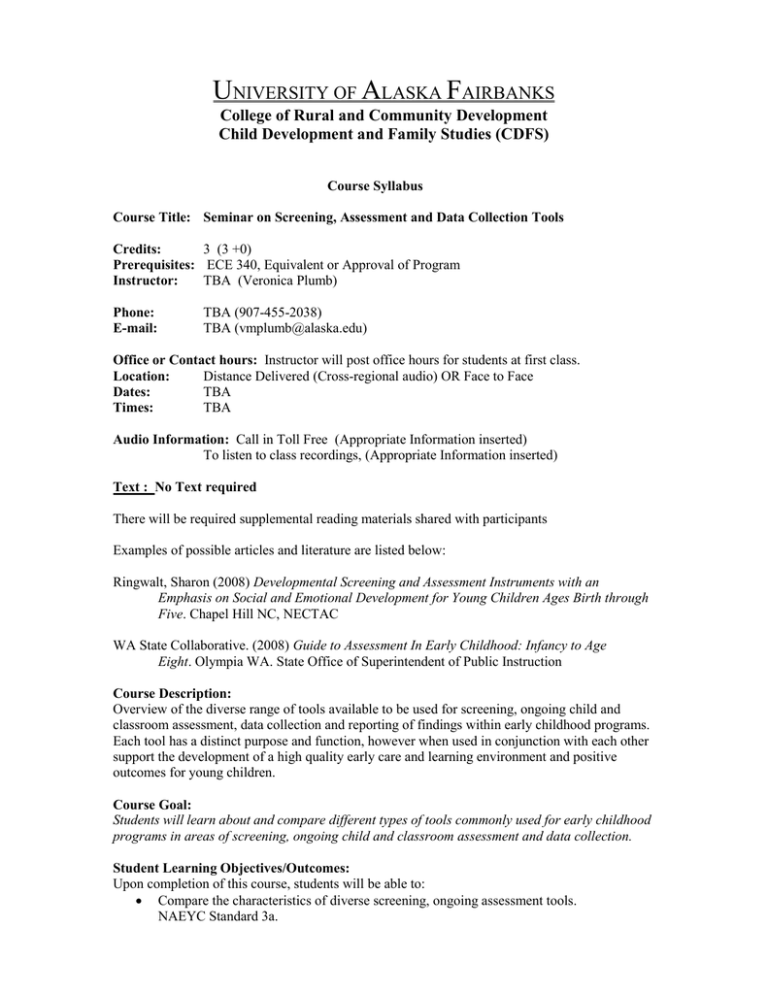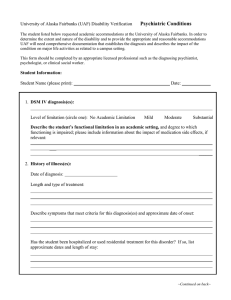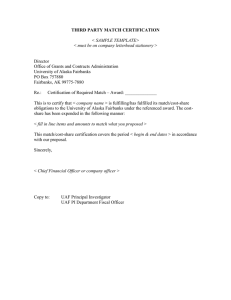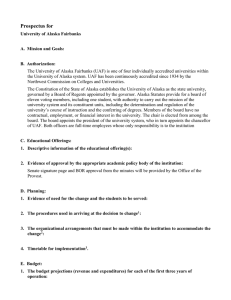U A F NIVERSITY OF
advertisement

UNIVERSITY OF ALASKA FAIRBANKS College of Rural and Community Development Child Development and Family Studies (CDFS) Course Syllabus Course Title: Seminar on Screening, Assessment and Data Collection Tools Credits: 3 (3 +0) Prerequisites: ECE 340, Equivalent or Approval of Program Instructor: TBA (Veronica Plumb) Phone: E-mail: TBA (907-455-2038) TBA (vmplumb@alaska.edu) Office or Contact hours: Instructor will post office hours for students at first class. Location: Distance Delivered (Cross-regional audio) OR Face to Face Dates: TBA Times: TBA Audio Information: Call in Toll Free (Appropriate Information inserted) To listen to class recordings, (Appropriate Information inserted) Text : No Text required There will be required supplemental reading materials shared with participants Examples of possible articles and literature are listed below: Ringwalt, Sharon (2008) Developmental Screening and Assessment Instruments with an Emphasis on Social and Emotional Development for Young Children Ages Birth through Five. Chapel Hill NC, NECTAC WA State Collaborative. (2008) Guide to Assessment In Early Childhood: Infancy to Age Eight. Olympia WA. State Office of Superintendent of Public Instruction Course Description: Overview of the diverse range of tools available to be used for screening, ongoing child and classroom assessment, data collection and reporting of findings within early childhood programs. Each tool has a distinct purpose and function, however when used in conjunction with each other support the development of a high quality early care and learning environment and positive outcomes for young children. Course Goal: Students will learn about and compare different types of tools commonly used for early childhood programs in areas of screening, ongoing child and classroom assessment and data collection. Student Learning Objectives/Outcomes: Upon completion of this course, students will be able to: Compare the characteristics of diverse screening, ongoing assessment tools. NAEYC Standard 3a. 2 Classify how to choose and plan for use of screening, ongoing assessment and data collection within an early childhood program. NAEYC Standard 3c Articulate the roles of families, teaching staff and program administration in regards to screening, ongoing assessment and data collection. NAEYC Standard 3d Description of Instructional Methods The method of instruction will be a combination of reading assignments, written assignments, Blackboard (Bb), and field work. Students will demonstrate their understandings of course content and proficiency of skill through assignments and discussion. All assignments will be communicated through the assignments section of the course Bb site. Other communication will take place through email. Requirements and Assignments: Upper Division writing and critical analysis skills are required for this course. Written assignments and projects are to be formatted using APA and typed. Font size should be 10 – 12, depending on the type of font. Spacing between lines should be 2.0. Black ink on white paper is strongly preferred. Color graphics are acceptable, but not necessary. Assessment Tool Action Project will be an action research project demonstrating your knowledge and use of an Environmental Rating Scale discussed in this course in conjunction with an action plan of use within an early childhood program. Choice of tools well be determined by each student and will be relevant to current early childhood program of which they are employed. The paper will be written using APA formatting. Final Project and positing due - To Be Determined Content Assignments will be directly related to the course topic, students will respond to assorted screening, ongoing assessment and data collection tools with written responses. All assignments will be completed using APA formatting. Written responses should be a minimum of 2 pages in length and will include a description of the environment were the tool would most efficiently be used; place, ages of children and size of group, description of facilitation and personal thoughts in regards to use in each student’s current working environment. Ending Reflection: This will be a complete documentation of your knowledge acquisition and skill growth around tools used for screening, ongoing assessment and data collection. Course Evaluation: A letter grade will be issued for participants. (Note that you must receive a C or higher for this course to count towards the Learn & Grow: Alaska’s Quality Recognition & Improvement Program – Administrator Credential and the Child Development Family Study BA Grading is based on: Assignment Content Assignment 10@10 points each Assessment Tool Action Project Final Reflection Total Points -2- Points 100 200 50 350 3 All coursework will be evaluated on the following: a) Organization b) Clarity c) Consistency of thought and format d) Reflection of course content e) Thoughtful assimilation/accommodation with evidence of conceptual connections and understanding of content f) Written work contains no or few distracting elements such as spelling errors. Grade A = 100% - 90% Points 350-315 B = 89% - 80% 314-280 C = 79% - 70% 279-245 D = 69% - 60% 244-210 F = below 60 % 209below Definition An honor grade. Demonstrates originality, independence, a thorough mastery of the subject; completing more work than is regularly required. Demonstrates a deep understanding, presented with exceptional clarity & poise. Better than the average. Above the average expectation. Projects or papers are presented neatly and thoroughly but do not have the depth and originality for an “A.” Average. The student grasps the essential information; material is complete and presented on time. Any Grade below a C will need to be repeated for the CDFS BA Major and Concentration Below average. Student misses significant aspects of the assignment. Material is not turned in on time; student is unprepared to present project to class. Student was unable to complete the assignment on time with at least a 60% understanding and presentation. Instructor Response Time and How to Check your Grades Inquiries from student sent through email will be acknowledged within 48 hours. Lessons will be graded within one week after the due date – unless notice of delays are shared with students from the instructor. To check your grades for assignment and find comments from your instructor, clink on the My Grades link in the sidebar menu. All assignments and their due dates are listed. To see details of your grades, clink on the green check mark or the underlined score in the grade column. If the score is for an assignment, this will take you to a Review Submission History page where you will see a recap of what you submitted, your grade, and your instructor’s comments and feedback. No Basis (NB), Incompletes, and Instructor Withdrawal (W) This course adheres to the UAF Procedure regarding the granting of NB Grades. The NB grade is for use only in situations in which the instructor has No Basis upon which to assign a grade. In general, the NB grade will not be granted. University of Alaska Fairbanks Incomplete Grade Policy: “The letter “I” (Incomplete) is a temporary grade used to indicate that the student has satisfactorily completed (C or better) the majority of work in a course but for personal reasons beyond the student’s control, such as sickness, he has not been able to complete the -3- 4 course during the regular semester. Negligence or indifference is not acceptable reasons for an “I” grade.” Successful, Timely Completion of this Course Starting and establishing your progress through this course early can help to encourage your successful completion of the course. Title IX University of Alaska Board of Regents have clearly stated in BOR Policy that discrimination, harassment and violence will not be tolerated on any campus of the University of Alaska If you believe you are experiencing discrimination or any form of harassment including sexual harassment/misconduct/assault, you are encouraged to report that behavior. If you report to a faculty member or any university employee, they must notify the UAF Title IX Coordinator about the basic facts of the incident. Your choices for reporting include: 1) You may access confidential counseling by contacting the UAF Health & Counseling Center at 474-7043; 2) You may access support and file a Title IX report by contacting the UAF Title IX Coordinator at 474-6600; 3) You may file a criminal complaint by contacting the University Police Department at 474-7721. Support Services Academic Integrity and Plagiarism As described by UAF, scholastic dishonesty constitutes a violation of the university rules and regulations and is punishable according to the procedures outlined by UAF. Scholastic dishonesty includes, but is not limited to, cheating on an exam, plagiarism, and collusion. Cheating includes providing answers to or taking answers from another student. Plagiarism includes use of another author’s words or arguments without attribution. Collusion includes unauthorized collaboration with another person in preparing written work for fulfillment of any course requirement. Scholastic dishonesty is punishable by removal from the course and a grade of “ F.” For more information go to Student Code of Conduct. (http://www.uaf.edu/catalog/catalog_0809/academics/regs3.html#Student_Conduct) Student Support Services: The University has many student support programs. If you need assistance please contact any of the following service programs or departments. The Child Development and Family Studies (CDFS) program helps students with registration and development of successful course schedules. The program is able to provide information about course assignments as well as records of students admitted to the CDFS program, as well as answers general program related questions. Program advisors can help students communicate with instructors, and locate relevant resources. The CDFS student services staff is Jennifer Russell (907) 455-2038 OR toll free 1-888 -560-5860 e-mail jlrussell2@alaska.edu UAOnline http:// uaonline.alaska.edu/ Your resource for transcripts, accounts and other personal information Disabilities Services: The Child Development and Family Studies program will work with the Office of Disability Services to provide reasonable accommodation to students with disabilities. Disability Services provide a variety of services to assure equal access for all students. Interpreting services, -4- 5 educational assistants, note taking, and exam accommodations for students are the most frequently provided accommodations. The Office of Disability Services implements the American with Disabilities Act (ADA), and insures that the UAF students have equal access to the campus and course materials. (203 WHIT, 474-7043) I will work with the Office of Disabilities Services to provide reasonable accommodation to students with disabilities. Disability services also provides assistance to the university’s rural campuses. Bristol Bay, Chuckchi, Interior-Aleutions, Kuskokwim, and Northwest. Questions should be directed to the Director of Disability Services at (907) 474-5655 or online at http://www.uaf.edu/disability/ Representatives from the office also regularly meet students in the CTCC building. Check with the CTCC student services for more information, 455-2851 or 2849. UAF Office of Disability Services 612 N. Chandalar, PO box 755590 University of Alaska Fairbanks, Alaska 99775-5590 Phone: (907) 474-5655| TTY: (907) 474-1827 | FAX: 474-5688 Email: fydos@alaska.edu Writing Center http://www.alaska.edu/english/studentresources/writing/ The Writing Center is a student-staffed, student-oriented service of the English Department. 801 Gruening Bldg., P.O. Box 755720 Fairbanks, Alaska 99775-5720 Phone: (907) 474-5314 Fax: 1-800-478-5246 * The UAF Writing Center and Computer Lab offers free writing tutoring to any student in any subject via telephone and fax or over the Internet. Students can call 907-474-5314 for information on how to fax a paper and have it tutored over the telephone, or engage in an interactive Internet session. Both services are free. Rural Students Services http://www.uaf.edu/ruralss/ Rural Student Services (RSS) is an academic advising department with over 35 years of experience in working with students from all over the state of Alaska. We are here to assist you in achieving student success by linking you to current information pertinent to your education, lifestyle, and goals. RSS is known for its welcoming and friendly environment. Many students find meaningful connection at UAF through RSS. We can help you with: Academic requirements Registration for classes Finding financial aid Explaining housing options Declaring a major Career exploration CONTACT US AT: P.O. box 756320, Fairbanks, AK 99775-6320 1-888-478-1452 (toll free within Alaska) or (907) 474-7871 Email us at fyrss@uaf.edu Library Services for off campus students http://library.uaf.edu/offcampus -5- 6 Off-Campus Library Services is a unit set up to serve rural UAF students and faculty who do not have access to appropriate information resources in their town or village. We work in support of The College of Rural & Community Development and The Center for Distance Education and Independent Learning. We can supply your information needs for the courses you are taking. For example, if a research paper is required in the teleconference or correspondence course that you are taking, you can contact us, explain your information need, and we will send library materials to you so that you can write your paper. Contact us at Off-Campus Services, Elmer E. Rasmuson Library 310 Tanana Loop, PO Box 756800 Fairbanks, Alaska USA 99775-6800 Phone: 1-800-478-5348 Email: fyddl@uaf.edu For more off campus help go to: http://www.uaf.edu/library/instruction/ls101/other/Distance_Resources.html Computer, Internet and Software Problem: you cannot get your email Make sure your Internet connection is working; to test it, you can try to go to a new web page and see if it loads. • If you are having problems with a UAF account, you will need to contact the UAF help desk 1.800.478.4667. If it is another company’s account, you will need to contact their customer support. There is very little we can do to assist you as we have no control or access to the computers that serve the email. • Check with your email program’s Help. Problem: you forgot your password • Only the organization that issued your password can do anything to change it. You will need to contact them. For UAF email and Blackboard it is the UAF help desk 1.800.478.4667. For most web services there is a link you can click if you forgot your password. I also recommend writing them down somewhere for back up. Problem: you are having problems with Blackboard • You will need to contact the Blackboard administrator, at: http://classes.uaf.edu/ Office of Information Technology Help Desk 474.6564 or 1.800.478.4667 -6-


